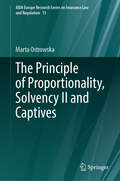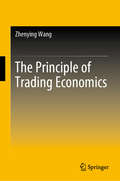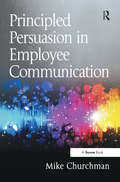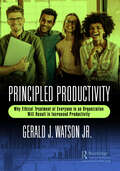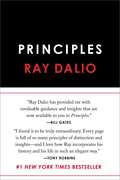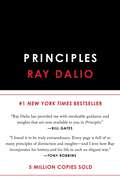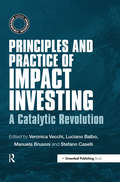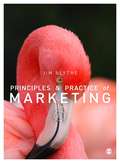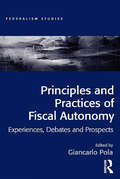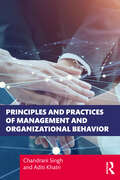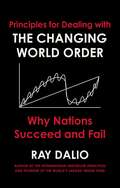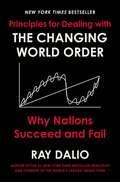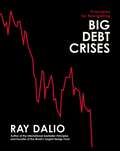- Table View
- List View
The Principle of Proportionality, Solvency II and Captives (AIDA Europe Research Series on Insurance Law and Regulation #13)
by Marta OstrowskaThis book offers an in-depth analysis of the principle of proportionality in the EU insurance regulatory regime. It takes a critical look at how proportionality has been implemented in Solvency II and tests its effectiveness on captive (re)insurance undertakings. Given their unique business model, captives are considered the primary beneficiary of proportionality and therefore offer the perfect ‘litmus test’ for the principle’s effectiveness. In a world characterized by overregulation and increasingly complex financial markets, governments and policymakers face the challenge of regulating markets without hindering their growth. As ‘one-size-fits-all’ approaches have long-since been recognized as detrimental, the EU is seeking to develop a regulatory technique which allows more individual regulatory treatment while ensuring a level playing field. The first revolutionary step towards this goal was taken in Solvency II (Directive 2009/138/EC), which introduced a principle of proportionality to the EU insurance market. The principle is a unique tool which makes it possible to adjust the requirements of the Solvency II framework to the nature, scale, and complexity of each individual insurance undertaking’s risk profile. It is intended to help remove an unnecessary regulatory burden for insurance undertakings, and to prevent the proliferation of regulations in general. However, the practical implementation of proportionality is not without its share of obstacles. The principle’s generic nature and the lack of guidance have caused a great deal of confusion regarding its practical application and prevented insurance undertakings from using its benefits to the fullest. Consequently, the principle of proportionality has been subject to revision within the first Solvency II review process. The book will benefit captive owners, captive managers, regulators, supervisors, practitioners, academics, students and, more generally, all those involved with or interested in the insurance market.
The Principle of Trading Economics
by Zhenying WangThis book is devoted to establishing a completely new concept within economics referred to as "trading economics" which is a reconstructed economic system in theory that seeks perfect harmony between micro and macro elements in a structured way, hence making the economic theory a rigorous system supported by internal logical continuity. Representing a revolution of the existing theoretical framework, trading economics has changed the logic of mainstream economics. Specifically, it deduces the "macro whole" from the "micro individuals", and it introduces a systematic and comprehensive analysis approach. It stresses that within an interconnected world, the interaction between trading agents is the fundamental driving force behind the operation, development and evolution of the economic system.
Principled Persuasion in Employee Communication
by Mike ChurchmanPrincipled Persuasion in Employee Communication highlights a new but significant dilemma for organisational leaders. Will they continue on the same track that, since the nineteenth century, has led them to exert increasing control over their employees? Or will they take another path, one that leads towards a new type of working environment where the culture encourages freedom of communication and movement? This book argues for an approach to employee communication that sets out to liberate employees from the stifling constraints that organisations continue to impose on them. Principled Persuasion is so-called because it uses persuasive techniques, based on clear principles, to create new, forward-looking organisational cultures. It sets out to increase employee happiness and minimise the harms done to employees at work. It grounds itself on a strong ethical base composed of fundamental, universal principles. It introduces a new approach to the use of language, not only calling for more clarity and meaning in organisational communication, but also for a more conscious use of rhetorical techniques to change vocabulary, metaphors and internal dialogue for the better. Make no mistake, most organisations have totally underrated the strategic importance of employee communication. Principled Persuaders understand that the key to dealing with the unpredictable events about to unfold in the twenty-first century will be a new way of communicating with the workforce. The flexibility, adaptability and innovation that will be needed to survive and prosper in coming decades can only be achieved by liberating employees, not imprisoning them further in established systems and processes.
Principled Productivity: Why Ethical Treatment of Everyone in an Organization Will Result in Increased Productivity
by Gerald J. Watson Jr.This book demonstrates that ethical treatment of everyone in an organization: 1. Will increase productivity in all the functional activities of the organization as well as its members. 2. Will ensure the growth of the organization as a result of continuous improvements that may have been initiated by management but will be continuously improved by motivated employees. It achieves this by: 1. The presentation of examples from personal experience and a review of the literature. 2. Providing a list of critical questions for each function whose correct solutions will provide a metric that enables and establishes obtainable goals for improvement. This book is unique because it requires the decision-maker to examine each potential decision and ask the questions: 1. Do alternative methods exist that will achieve the desired goals, which will minimize the long-term adverse effects on affected employees and the future viability of the organization? 2. When is the appropriate time to implement this decision? 3. What is the best way to implement this decision? The decision may involve a reduction in force (RIF), a potential change in a vendor or a manufacturing process, the formation of a safety team, and/or the installation or modification of an incentive system. The decisions could be involved in manufacturing, logistics, quality, or healthcare. This work will benefit everyone in leadership positions in all branches of government, manufacturing, logistics, human relations, and healthcare, especially those working with frontline employees, staff, and customers.
Principles: Life And Work
by Ray Dalio#1 New York Times Bestseller “Significant...The book is both instructive and surprisingly moving.” —The New York Times Ray Dalio, one of the world’s most successful investors and entrepreneurs, shares the unconventional principles that he’s developed, refined, and used over the past forty years to create unique results in both life and business—and which any person or organization can adopt to help achieve their goals.In 1975, Ray Dalio founded an investment firm, Bridgewater Associates, out of his two-bedroom apartment in New York City. Forty years later, Bridgewater has made more money for its clients than any other hedge fund in history and grown into the fifth most important private company in the United States, according to Fortune magazine. Dalio himself has been named to Time magazine’s list of the 100 most influential people in the world. Along the way, Dalio discovered a set of unique principles that have led to Bridgewater’s exceptionally effective culture, which he describes as “an idea meritocracy that strives to achieve meaningful work and meaningful relationships through radical transparency.” It is these principles, and not anything special about Dalio—who grew up an ordinary kid in a middle-class Long Island neighborhood—that he believes are the reason behind his success. In Principles, Dalio shares what he’s learned over the course of his remarkable career. He argues that life, management, economics, and investing can all be systemized into rules and understood like machines. The book’s hundreds of practical lessons, which are built around his cornerstones of “radical truth” and “radical transparency,” include Dalio laying out the most effective ways for individuals and organizations to make decisions, approach challenges, and build strong teams. He also describes the innovative tools the firm uses to bring an idea meritocracy to life, such as creating “baseball cards” for all employees that distill their strengths and weaknesses, and employing computerized decision-making systems to make believability-weighted decisions. While the book brims with novel ideas for organizations and institutions, Principles also offers a clear, straightforward approach to decision-making that Dalio believes anyone can apply, no matter what they’re seeking to achieve. Here, from a man who has been called both “the Steve Jobs of investing” and “the philosopher king of the financial universe” (CIO magazine), is a rare opportunity to gain proven advice unlike anything you’ll find in the conventional business press.
Principles: Life and Work (Principles)
by Ray Dalio#1 NEW YORK TIMES BESTSELLER * 5 MILLION COPIES SOLD&“Significant...The book is both instructive and surprisingly moving.&” —The New York TimesRay Dalio, one of the world&’s most successful investors and entrepreneurs, shares the unconventional principles that he&’s developed, refined, and used over the past forty years to create unique results in both life and business—and which any person or organization can adopt to help achieve their goals.In 1975, Ray Dalio founded an investment firm, Bridgewater Associates, out of his two-bedroom apartment in New York City. Forty years later, Bridgewater has made more money for its clients than any other hedge fund in history and grown into the fifth most important private company in the United States, according to Fortune magazine. Dalio himself has been named to Time magazine&’s list of the 100 most influential people in the world. Along the way, Dalio discovered a set of unique principles that have led to Bridgewater&’s exceptionally effective culture, which he describes as &“an idea meritocracy that strives to achieve meaningful work and meaningful relationships through radical transparency.&” It is these principles, and not anything special about Dalio—who grew up an ordinary kid in a middle-class Long Island neighborhood—that he believes are the reason behind his success. In Principles, Dalio shares what he&’s learned over the course of his remarkable career. He argues that life, management, economics, and investing can all be systemized into rules and understood like machines. The book&’s hundreds of practical lessons, which are built around his cornerstones of &“radical truth&” and &“radical transparency,&” include Dalio laying out the most effective ways for individuals and organizations to make decisions, approach challenges, and build strong teams. He also describes the innovative tools the firm uses to bring an idea meritocracy to life, such as creating &“baseball cards&” for all employees that distill their strengths and weaknesses, and employing computerized decision-making systems to make believability-weighted decisions. While the book brims with novel ideas for organizations and institutions, Principles also offers a clear, straightforward approach to decision-making that Dalio believes anyone can apply, no matter what they&’re seeking to achieve. Here, from a man who has been called both &“the Steve Jobs of investing&” and &“the philosopher king of the financial universe&” (CIO magazine), is a rare opportunity to gain proven advice unlike anything you&’ll find in the conventional business press.
Principles and Paradoxes of Sports Economics: Contributions in Honor of Rodney Fort (Sports Economics, Management and Policy #26)
by Stefan SzymanskiThis book is a Festschrift in honor or Professor Rod Fort, one of the leading contributors to the emerging field of sports economics in the past half century. Professor Fort’s path-breaking research in the 1990s and 2000s both laid down an agenda for research in sports economics and popularized the application of economic analysis to sports issues for lay readers. The contributors to the volume are among the leading scholars in modern sports economics. They put issues highlighted in Professor Fort’s research in the context of current issues. Topics discussed include competitive balance and outcome uncertainty estimation, gender-wage discrimination in US professional soccer, and the paradox of fan loyalty.
Principles and Patterns of Disruptive Innovation
by Joseph V. Sinfield Scott D. Anthony Mark W. Johnson Elizabeth J. AltmanThis chapter highlights key innovation traps and summarizes the processes and principles that will significantly increase your chances of creating growth through innovation.
Principles and Pluralist Approaches in Teaching Economics: Towards a Transformative Science (Routledge Advances in Heterodox Economics #41)
by Samuel Decker Wolfram Elsner Svenja FlechtnerThis volume is a state-of-the-art compilation of diverse and innovative perspectives, principles, and a number of practiced approaches of fields, courses, and methods of pluralist economics teaching. It fosters constructive controversy aiming to incite authors and commentators to engage in fruitful debate. The complex economic problems of the 21st century require a pluralist, real-world oriented, and innovative discipline of economics, capable of addressing and teaching those complex issues to students from diverse perspectives. This volume addresses a number of key questions: Which models could be taught outside the equilibrium and optimality paradigm? Which methods could help to improve our understanding of the complex globalized economy? How can qualitative and quantitative methods be combined in a fruitful way to analyze complex economic problems? How can the academic isolation of mainstream economics that has developed over many decades be overcome, despite its attempted transdisciplinary imperialism? What role should knowledge from other disciplines play in teaching economics, and what is the relevance of transdisciplinarity? Through examining these issues, the editors and authors have created a pluralist but cohesive book on teaching economics in the contemporary classroom, drawing from ideas and examples from around the world. Principles and Pluralist Approaches in Teaching Economics is a unique collection of diverse perspectives on the methodology and applications of pluralist economics teaching. It will be a great resource for those teaching economics at various levels as well as researchers and intermediate and advanced students searching for pluralism in economics.
Principles and Practice of Electrical Epilation
by Sheila GodfreyWritten for the practising electrolysist and student 'The Principles and Practice of Electrical Epilation' covers all aspects of electro-epilation and takes into account recent changes and advances in training and technology during the past decade. This new edition brings these changes into focus. Topics covered in the third edition of this book include: * improved standards of training * the Blend technique of electro-epilation * the development of pre-sterilized disposable needles * training * health and safety at work.A knowledge of endocrinology, the structure and growth cycle of hair, the skin, hygiene, electricity and basic first aid is essential to an understanding of why hair growth occurs, and this problem - which causes distress to very many people - can be treated both safely and efficiently. The book covers all these topics, and also gives advance on how to set up your own practice.
Principles and Practice of Impact Investing: A Catalytic Revolution (The Responsible Investment Series)
by Veronica Vecchi Luciano Balbo Manuela Brusoni Stefano CaselliImpact investing is gaining global attention from society, governments and businesses. Increasingly, it is seen as a new paradigm to deal with the economic crisis and curtailed public budgets, an answer to the diversified needs of society. It now ranks high on the policy agenda of governments and international organizations, and private investors are searching for new investment opportunities to channel the liquidity available. This book is the first to look at impact investing as a "refocus" of venture capital to sustain the development of societal impact enterprises. Principles and Practice of Impact Investing collects chapters from international experts on the subject, discussing the foundations of the movement, analysing leading international cases and debating future trends in the field. It also includes interviews with some of the most influential stakeholders of impact investing across the world. The book is an inspirational and practical guide for actors and stakeholders to enable better understanding of impact investing. Taking an international perspective, the chapters primarily deal with mature economies, setting it apart from the existing literature focused on emerging countries. The book will be of interests to practitioners and executives, as well as researchers and MBA students.
Principles and Practice of Islamic Leadership
by Mahazan Abdul Mutalib Ahmad Rafiki Wan Mohd Wan RazaliThis book elaborates the fundamental principles and practices of Islamic leadership and management by highlighting its underlying philosophies, key concepts, and sources. The book closely examines the relationship of Islamic leadership with spiritual leadership and how it shapes the concept of leadership. The book also compares Islamic Leadership with other related spiritual leadership concepts such as the Servant Leadership, religiosity, and other conventional leadership perspectives based on Islamic framework. The chapters within the book delve into Islamic teachings and values from Al-Qur’an and Hadith that can be applied when governing an organization using several case studies. This insightful and thorough discussion on Islamic leadership will be useful as a reference for academic courses on leadership, and current and aspiring business leaders.
Principles and Practice of Marketing
by Jim BlytheWhen you think of marketing you may think of the adverts that pop up at the side of your screen or the billboards you see when you're out - all those moments in the day when somebody is trying to grab your attention and sell you something! Marketing is about advertising and communications in part, but it's also about many other things which all aim to create value for customers, from product research and innovation to after-care service and maintaining relationships. It's a rich and fascinating area of management waiting to be explored - so welcome to Marketing! <P><P> Jim Blythe's Principles and Practice of Marketing will ease you into the complexities of Marketing to help you achieve success in your studies and get the best grade. It provides plenty of engaging real-life examples, including brands you know such as Netflix and PayPal - marketing is not just about products, but services too. Marketing changes as the world changes, and this textbook is here to help, keeping you up to speed on key topics such as digital technologies, globalization and being green. <P> The companion website offers a wealth of resources for both students and lecturers and is available at www.sagepub.co.uk/blythe3e.
Principles and Practice of Property Valuation in Australia
by David ParkerThis book provides a clear outline of the key principles underlying property valuation and the current techniques and issues in the practice of valuation for the major sectors of the Australian real estate market. Formerly titled Valuation Principles and Practice, this entirely new third edition comprises Australia's leading advanced valuation textbook. The first part of the book, Principles of valuation, comprises chapters written by globally recognised academics and specialists on the principles of law, economics, planning, policy and finance, all in the context of property valuation. The second part of the book, Practice of valuation, comprises chapters written by acknowledged expert valuers on the practice of valuation for key property sectors including residential, retail, commercial, industrial, leisure and rural. Further, chapters also cover valuations for purposes including lending, insurance, rating, taxation and financial reporting. The most up to date valuation text for the Australian market, this book will appeal to both valuation practitioners and undergraduate/postgraduate students as well as to accountants, lawyers and professionals dealing with property valuation issues.
Principles and Practice of Social Marketing
by Rob Donovan Nadine HenleyTheory and practice come together by combining the latest research with real-life examples of social marketing campaigns.
Principles and Practices of Fiscal Autonomy: Experiences, Debates and Prospects (Federalism Studies)
by Giancarlo PolaThis century has seen the continuation of long-term trends in the movement of the territorial boundaries of nation states alongside the emergence of new tensions. The repercussions of the Scottish referendum and the heightened urgency of the Catalonia question along with the continued economic problems faced by the Eurozone have given new energy and context to debates on institutional and fiscal autonomy. Assessing the impact of increasing calls for wider fiscal autonomy in the UK, Spain, Switzerland, Argentina, Brazil, Germany, Italy and the USA this volume updates and adds significant new context to the debate. Framing the discussion on fiscal autonomy and drawing out ethical considerations it portrays the problems connected with the devolution of responsibilities and financial resources to sections of the population, sometimes content to be part of a lower layer of government, sometimes aspiring to an asymmetrical position or total independence.
Principles and Practices of Management and Organizational Behavior
by Chandrani Singh Aditi KhatriThis book offers perspectives, insights, techniques, and approaches for efficient and contemporary management practices in an organization. It provides a comprehensive insight into the traditional and contemporary approaches of organizational behavior and their impact on organizational performance in the global era. Ranging from planning to staffing, and controlling to strategic decision-making, the case studies in the book incorporate relevant modern management models and correlate practices of management from organizational perspectives to allow any organization’s direction and environment to be evaluated with suggested recommendations. This textbook consists of two broad parts. The first deals with management trends and functions ranging from the traditional era to the contemporary world. The second part explores the behavioral trends of organizations across domains to analyze the measures taken for improved productivity and sustainability. Drawing theories from psychology, sociology and economics, this book probes into the interrelation between behavior and holistic management by examining the impact of teamwork, motivation, organizational power, and polity, instituting relevant organizational ethics and strategies to create healthy organizational culture. This book will be useful to students, academicians, management researchers, and industry professionals from the field of general management and organizational behavior. It will also be useful for scholars interested in management studies, behavioural studies, business and development, developmental studies, sociopsychology, management, and business strategies.
Principles and Practices of Management and Organizational Behavior
by Chandrani Singh Aditi KhatriThis book offers perspectives, insights, techniques, and approaches for efficient and contemporary management practices in an organization. It provides a comprehensive insight into the traditional and contemporary approaches of organizational behavior and their impact on organizational performance in the global era. Ranging from planning to staffing, and controlling to strategic decision-making, the case studies in the book incorporate relevant modern management models and correlate practices of management from organizational perspectives to allow any organization’s direction and environment to be evaluated with suggested recommendations. This textbook consists of two broad parts. The first deals with management trends and functions ranging from the traditional era to the contemporary world. The second part explores the behavioral trends of organizations across domains to analyze the measures taken for improved productivity and sustainability.Drawing theories from psychology, sociology and economics, this book probes into the interrelation between behavior and holistic management by examining the impact of teamwork, motivation, organizational power, and polity, instituting relevant organizational ethics and strategies to create healthy organizational culture.This book will be useful to students, academicians, management researchers, and industry professionals from the field of general management and organizational behavior. It will also be useful for scholars interested in management studies, behavioural studies, business and development, developmental studies, sociopsychology, management, and business strategies.
Principles and Practices of Transportation Planning and Engineering
by Connie Tang Lei ZhangConnie Kelly Tang and Lei Zhang have provided a holistic coverage of the entire surface transportation project and program development process from the beginning of planning though environmental approval, design, right-of way acquisition, construction to operations and maintenance.— Neil Pedersen, Executive Director, Transportation Research Board, National Academies of Sciences, Engineering, and Medicine, Washington, DC Transportation program and project development is complex. The process spans over planning, programming, environment, design, right of way, construction, operations, and maintenance. Professionals from civil engineering, planning, social and environmental sciences, business and project management, and data science, work together in a relay team to transform an idea into a highway, a transit hub, an airport or a water facility. It is challenging for any one person to master all the knowledge and skills needed to perform every relevant task. However, it is critical for all involved to understand how this relay works and how the societal, environmental, governmental, and regulatory contexts influence the process and the technical solution. Professionals who understand the process and see the big picture are those who rise to the top as leaders. Transportation Project and Program Development provides holistic coverage on the technical subject matter, processes and procedures, and policy and guidance associated with transportation project and program development, which can help professionals become program leaders. For each phase of the process, key products delivered, processes used, governing principles, foundations of applicable science and engineering, technologies deployed, and knowledge required are discussed. While all coverages reflect the practices of the United States, the logic, principles, science, and engineering are applicable to all countries of the world. The book can also serve as an introductory textbook for undergraduate students and as a textbook or reference for a graduate-level course in civil engineering, transportation engineering, planning, and project management.
Principles for Dealing with the Changing World Order: Why Nations Succeed or Fail (Principles Ser.)
by Ray DalioFrom legendary investor Ray Dalio, author of the international bestseller Principles, who has spent half a century studying global economies and markets, Principles for Dealing with the Changing World Order examines history&’s most turbulent economic and political periods to reveal why the times ahead will likely be radically different from those we&’ve experienced in our lifetimes - but similar to those that have happened many times before. A few years ago, Ray Dalio noticed a confluence of political and economic conditions he hadn&’t encountered before. They included huge debts and zero or near-zero interest rates that led to massive printing of money in the world&’s three major reserve currencies; big political and social conflicts within countries, especially the US, due to the largest wealth, political and values disparities in more than 100 years; and the rising of a world power (China) to challenge the existing world power (US) and the existing world order. The last time that this confluence occurred was between 1930 and 1945. This realisation sent Dalio on a search for the repeating patterns and cause/effect relationships underlying all major changes in wealth and power over the last 500 years. In this remarkable and timely addition to his Principles series, Dalio brings readers along for his study of the major empires - including the Dutch, the British and the American - putting into perspective the 'Big Cycle' that has driven the successes and failures of all the world&’s major countries throughout history.Dalio reveals the timeless and universal forces behind these shifts and uses them to look into the future, offering practical principles for positioning oneself for what&’s ahead.
Principles for Dealing with the Changing World Order: Why Nations Succeed and Fail (Principles)
by Ray DalioNEW YORK TIMES BESTSELLER * MORE THAN ONE MILLION COPIES SOLD &“A provocative read...There are few tomes that coherently map such broad economic histories as well as Mr. Dalio&’s. Perhaps more unusually, Mr. Dalio has managed to identify metrics from that history that can be applied to understand today.&” —Andrew Ross Sorkin, The New York Times From legendary investor Ray Dalio, author of the #1 New York Times bestseller Principles, who has spent half a century studying global economies and markets, Principles for Dealing with the Changing World Order examines history&’s most turbulent economic and political periods to reveal why the times ahead will likely be radically different from those we&’ve experienced in our lifetimes—and to offer practical advice on how to navigate them well. A few years ago, Ray Dalio noticed a confluence of political and economic conditions he hadn&’t encountered before. They included huge debts and zero or near-zero interest rates that led to massive printing of money in the world&’s three major reserve currencies; big political and social conflicts within countries, especially the US, due to the largest wealth, political, and values disparities in more than 100 years; and the rising of a world power (China) to challenge the existing world power (US) and the existing world order. The last time that this confluence occurred was between 1930 and 1945. This realization sent Dalio on a search for the repeating patterns and cause/effect relationships underlying all major changes in wealth and power over the last 500 years. In this remarkable and timely addition to his Principles series, Dalio brings readers along for his study of the major empires—including the Dutch, the British, and the American—putting into perspective the &“Big Cycle&” that has driven the successes and failures of all the world&’s major countries throughout history. He reveals the timeless and universal forces behind these shifts and uses them to look into the future, offering practical principles for positioning oneself for what&’s ahead.
Principles for Governance: Strategies for Reducing Inequality and Promoting Human Development (Sustainable Development Goals Series)
by Alfredo Pereira Francisco SousaThis edited volume provides strategies for reducing inequality and promoting human development through the use of innovative digital technology and the adoption of new bioethical principles for governance. The book is structured around a series of practical proposals which can be adapted to different circumstances, countries, and political systems. Written by an interdisciplinary panel of international researchers and professionals, each chapter details a proposal for a policy—new social technology, Green Deals, robust social assistance—that will move society forward towards a sustainable, digital, and equitable future. Researchers across multiple disciplines--public administration, cognitive technology, E-learning, finance, philosophy of economy, agronomics, forest engineering, bioethics and education—will find this volume a useful reference.
Principles for Navigating Big Debt Crises (Principles)
by Ray DalioRay Dalio, the legendary investor and #1 New York Times bestselling author of Principles—whose books have sold more than five million copies worldwide—shares his unique template for how debt crises work and principles for dealing with them well. This template allowed his firm, Bridgewater Associates, to anticipate 2008&’s events and navigate them well while others struggled badly.As he explained in his #1 New York Times bestseller Principles, Ray Dalio believes that most everything happens over and over again through time so that by studying patterns one can understand the cause-effect relationships behind events and develop principles for dealing with them well. In this three-part research series, he does just that for big debt crises and shares his template in the hopes of reducing the chances of big debt crises happening and helping them be better managed in the future. The template comes in three parts: 1. The Archetypal Big Debt Cycle (which explains the template) 2. Three Detailed Cases (which examines in depth the 2008 financial crisis, the 1930s Great Depression, and the 1920s inflationary depression of Germany&’s Weimar Republic) 3. Compendium of 48 Cases (which is a compendium of charts and brief descriptions of the worst debt crises of the last 100 years) Whether you&’re an investor, a policy maker, or are simply interested in debt, this unconventional perspective from one of the few people who navigated the crisis successfully, Principles for Navigating Big Debt Crises will help you understand the economy and markets in revealing new ways.
Principles for Navigating Big Debt Crises (Principles Ser.)
by Ray DalioRay Dalio, the legendary investor and international bestselling author of Principles - whose books have sold more than five million copies worldwide - shares his unique template for how debt crises work and principles for dealing with them well. This template allowed his firm, Bridgewater Associates, to anticipate 2008&’s events and navigate them well while others struggled badly. As he explained in his international bestseller Principles, Ray Dalio believes that almost everything happens over and over again through time, so that by studying patterns one can understand the cause-effect relationships behind events and develop principles for dealing with them well. In this three-part research series, he does just that for big debt crises and shares his template in the hopes of reducing the chances of big debt crises happening and helping them be better managed in the future. The template comes in three parts: 1. The Archetypal Big Debt Cycle (which explains the template) 2. Three Detailed Cases (which examines in depth the 2008 financial crisis, the 1930s Great Depression and the 1920s inflationary depression of Germany&’s Weimar Republic) 3. Compendium of 48 Cases (which is a compendium of charts and brief descriptions of the worst debt crises of the last 100 years)Whether you&’re an investor, a policy maker, or are simply interested in debt, this unconventional perspective from one of the few people who navigated the crisis successfully, Principles for Navigating Big Debt Crises will help you understand the economy and markets in revealing new ways.
Principles of Accounting: Volume 1: Financial Accounting
by Mitchell Franklin Patty Graybeal Dixon Cooper OpenStaxPrinciples of Accounting is designed to meet the scope and sequence requirements of a two-semester accounting course that covers the fundamentals of financial and managerial accounting. Due to the comprehensive nature of the material, we are offering the book in two volumes. This book is specifically designed to appeal to both accounting and non-accounting majors, exposing students to the core concepts of accounting in familiar ways to build a strong foundation that can be applied across business fields. Each chapter opens with a relatable real-life scenario for today’s college student. Thoughtfully designed examples are presented throughout each chapter, allowing students to build on emerging accounting knowledge. Concepts are further reinforced through applicable connections to more detailed business processes. Students are immersed in the “why” as well as the “how” aspects of accounting in order to reinforce concepts and promote comprehension over rote memorization.
